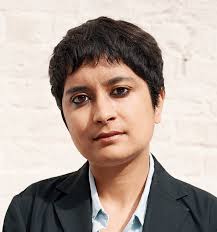Shami Chakrabarti: The Need for Loyal Dissent
 In a free society, dissent is a civic duty. The presumed fallibility of those in power leads to a system governed not by men, but by laws – a system of rights and due process. Fear can undermine this system. A scared population might be willing to give up certain rights and freedoms in favour of security. One measure of a democracy in any given society is how it treats its most reviled members. For the UK, prior to July of last year, that member was Abu Qatada.
In a free society, dissent is a civic duty. The presumed fallibility of those in power leads to a system governed not by men, but by laws – a system of rights and due process. Fear can undermine this system. A scared population might be willing to give up certain rights and freedoms in favour of security. One measure of a democracy in any given society is how it treats its most reviled members. For the UK, prior to July of last year, that member was Abu Qatada.
Mr Qatada came to the UK in 1993 and was granted asylum on grounds of the religious persecution he allegedly suffered in his native Jordan. In Britain, he quickly gained notoriety as a “hate cleric”, publicly preaching violence against non-Muslims. In October 2002, Mr Qatada was arrested in south London and taken to Belmarsh Prison, where he was detained indefinitely without charge under the Anti-Terrorism, Crime and Security Act 2001.
The UK government then wished to deport him to Jordan, where Mr Qatada had been convicted in absentia of conspiracy to carry out terror attacks in 1999 – a conviction based on evidence extracted through torture. In January 2012, after a decade of appeal and on and off detention, the European Court of Human Rights ruled that Mr Qatada could not be deported as that would be a violation of his right to a fair trial under Article 6 of the European Convention on Human Rights.
She was described as “the most effective public affairs lobbyist of the past twenty years” by The Times.
Following this ruling, many Britons including PM Cameron expressed frustration. Public opinion ran strongly in favour of deportation. In the British media, one dissenting voice speaking in defence of Mr Qatada rights was that of Shami Chakrabarti.
On the BBC’s This Week, Mrs Chakrabarti, director of the civil liberties pressure group Liberty, raised the question why, despite being detained on and off for ten years, no charges were ever brought against Mr Qatada; and why evidence used against him in the deportation case could not be used to try him in a British court.
Mrs Chakrabarti worked as a barrister for the Home Office before joining Liberty in 2001 as an in-house counsel. Since being appointed director in 2003, she has campaigned for human rights and the upholding of due process. Her frequent appearance on news and debate programmes, as well as in newspaper columns, has gained Mrs Chakrabarti much attention, though not always favourable.
She was described as “the most effective public affairs lobbyist of the past twenty years” by The Times and as “the most dangerous woman in Britain” by The Sun.
Though Mr Qatada was eventually deported to Jordan, his case brought Mrs Chakrabarti’s heroism to the fore. She bravely and eloquently stated her case in the face of hostile public opinion: Mr Qatada may be a villain, but that does not deprive him of his rights and those rights are worth defending.
When a fair trial at home becomes too much of a bother or when due process becomes too much of a hassle for both government and public, we all lose. The law is supposed to be tedious, inconvenient, and – at times – frustrating for those in power. A government that forgets this stands in need of loyal dissenters such as Shami Chakrabarti.
You may have an interest in also reading…
Natalia Vodianova: Rags to Riches Russian Style
Her face has graced the cover of all the major magazines, from Cosmopolitan to Marie Claire to Vogue in its
From Nigeria to UK – Dr Solomon Fubara: Helping the Diaspora Break into Business
Nigerian-born Dr Solomon Fubara did not quite set out to become a member of the UK diaspora community. In fact,
The Strongest Link in Global Supply Chains: Swiss Firm on its Way to Sector Supremacy
CFI.co in discussion with Charles Vincent, CEO of Arviem Founded in 2008 and headquartered in Baar, Switzerland, Arviem provides accurate

















































































